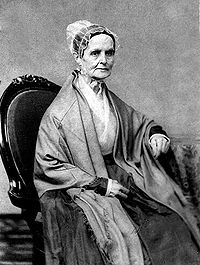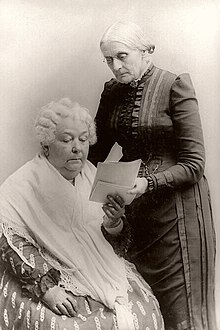 |
| Betty Friedan |
The only way for a woman, as for a man, to find herself, to know herself
as a person, is by creative work of her own. There is no other way.
~Betty Friedan
This past weekend I
was privileged to spend a little time with my mother, my sister and her
daughter. Three generations of women, gathered to spend time together.
Our bond of family and enduring love for one another runs very deep, and
that was evident.
I particularly enjoyed chatting with
my niece, a delightful young woman in her mid 20's. Married with a
career, she is about to embark on a real adventure in a move to
Australia to follow that career dream. The plan is for her to be there
for a few years to gain experience with her company, then hopefully
continue to advance. It will be a true adventure for her, and her
husband as well. I enjoyed hearing about her plans and found myself
marveling at her confidence, her ambition, and her assumption that she
will achieve her dreams.
I was listening to public radio
on the way to visit my mother yesterday and heard some women speaking of
Betty Friedan. For those readers who are not familiar with mid-20th
century feminists, Betty Friedan is considered one of the founders of
the modern feminist movement. She authored a book published in 1963
called
The Feminine Mystique which was a calling out of the
loathsome position many women found themselves in at that time--
educated, talented and experienced but out of work to stay home and be a
wife and mother. Friedan felt that these women were forced to forget their dreams of professional achievement. At that time, there were very few women working
professionally, and it was a societal norm that women who did have
careers would give it up once married with a family.
I
thought of my mother, who did indeed raise her family during the time
Friedan wrote her book, and how different her life had been than my own
or my sister's. And how different our lives have been to that of my
niece and her generation of women. As I listened to the show, I realized
that our lives changed as the Women's Movement changed. It has made a
huge difference in how each of us has lived. I found myself looking up
some of the earlier Women's movement figures and finding even more
parallels to my own family.
 |
| Meet
Lucretia Mott, born late 18th century. An abolitionist who realized
that not only were slaves without rights, but so were women of all
races. After the Civil War, she worked to change that. She was the
mentor of... |
 |
| Elizabeth
Cady Stanto and Susan B. Anthony, both of whom were early proponents of
voting rights for women. They worked tirelessly until the 19th
Amendment to the Constitution was ratified, giving women the right to
vote in 1920. | | | | |
|
|
My own grandmothers were young women in 1920. I never chatted with either of them about voting, and find myself wishing I had done so. My maternal grandmother was a devoted homemaker. I have many fond memories of her working in the kitchen, doing household chores, and she is the one who taught me to knit. But before she married my grandfather she had worked as a secretary. I have heard stories that she wished sometimes that she could have been a nurse. My paternal grandmother was the oldest of 7 children of a poor farmer, so her life had been one of helping both parents keep the farm and family going. She did not find homemaking all that rewarding, and later in her life helped her husband open a business. She continued to run it for awhile after his death. I never chatted with either of these women about what it was like for them as women... and I wonder now what impact the suffragette movement had on them.
My own mother was brought up in a world where higher education for her was considered a waste of time, where proper women did not have careers but stayed home to care for husband and children. That was her world... a kind of
Leave it to Beaver world, and my sister and I reaped the benefits of her attention. It is the world that Betty Friedan wrote about in her infamous book. My own mother did not feel the boredom or frustration or sense of purposelessness about which Friedan wrote. She loved being a homemaker. Or did she? When I was in junior high, my mother went back to work. She worked as a secretary in a variety of jobs until my father retired. Her jobs never paid much, but her stories of these jobs show she had a lot of responsibility. When put in the perspective of feminist movement history, her reentry into the workforce coincided with Friedan's book in the mid 1960's.
 |
| Gloria Steinem in the late 1960's was President of the National Organization of Women and published MS Magazine |
|
 |
| Carol Habisch burns her bra... |
In the late 60's, after Betty Friedan's book had taken the world by storm, there was a second wave of feminism. People like Gloria Steinem, Carol Habisch, Bella Abzug and others pushed for what became known as Women's Liberation. They wanted equal opportunity for all women, including an amendment to the US constitution forbidding any form of discrimination based on gender called The Equal Rights Amendment,. The rhetoric was extreme, but the ideas were equality and fairness.
I graduated from high school in 1970 and headed to the University of Michigan that fall, majoring in nursing. I had been raised in a loving home in conservative towns by conservative parents, protected from most of the unrest that was unfolding in America during that time. I was not prepared for the radical movements that were so highly visible on the Michigan campus. The Black Action Movement, the Anti Vietnam War movement, and the Women's Liberation movement were all vocal, visible, and in the face of students as we walked across campus. Listening to the rhetoric of these groups and discussing them in classes and with other students, I rapidly embraced a more liberal point of view. Especially towards women's issues. I left Michigan, eager to get started on a career and yet bound still to the idea of family and home. I married my college sweetheart, himself a liberal and in total agreement with my opinions on feminism. I worked... but once the babies arrived it seemed to change a bit. I had to balance work and career with family. He tried to do that too-- but eventually the solution was clear: I stayed home with the babies, working only on weekends. When they were school age, I went back to work full time and re-established a career. I do not regret a moment of those days. I am grateful to all the women who made it possible-- both the Women's Movement activists who made it possible for me to vote, to work outside the home, to participate in the world as anyone else, and my mother and grandmothers who showed me how to balance home and raising children and get some enjoyment from those endeavors. Both sides are important!!
 |
| Terry O'Neill, current President of NOW |
|
|
|
So where are we now on achieving the goals of those Women's Rights activists? Terry O'Neill, the current president of NOW, has been working on a host of issues: women's health care, equal pay for equal work (sound familiar?), and especially violence against women. I need only look at my nieces, and my daughter-in-law to see how family life has changed for the generation after me... they are all working women, who entered the work force with no intent or desire to "stay home with the kids" and who are making it work for them. They have married supportive men, all of whom see them as equals. Watching my sons both care for their children has been an especially rewarding benefit!
The world for women has changed, and will continue to change. I am grateful that women now have so many more choices available to them. And I am grateful for the activists who made those choices possible. We mustn't take our "liberation" for granted. Raise a glass to Betty Friedan, and to all the others, including our own mothers and grandmothers!!














